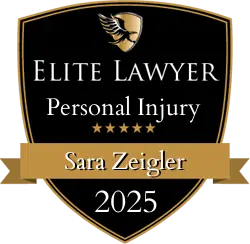Of all the different types of crashes involving commercial trucks, those due to overloading are some of the most dangerous. The Federal Highway Administration places weight limits on commercial trucks in an attempt to prevent these very serious accidents. Many people believe that it is impossible to determine when a truck is overloaded, but that is not true. Below, our West Virginia truck accident lawyer outlines the biggest dangers of overloaded trucks, and how to spot them so you can stay safe.
Increased Chance of Accidents
Overloaded trucks significantly increase the chance of a catastrophic accident because they have more mass and volume. It is challenging for truck drivers to maneuver their vehicle when it is overloaded. Simple driving tasks such as braking, turning, and changing lanes require control and precision and they become much more difficult when a truck is overloaded. According to NTEA, overloaded trucks account for more than 80 percent of truck accidents.
Increased Risk of Rollovers
Overloaded trucks have a much higher chance of rolling over. When a truck is carrying more weight than it can handle, the entire vehicle is thrown off balance. An imbalanced truck is extremely dangerous and can cause the vehicle to tip, particularly during sudden maneuvers and turns. Truck rollovers are some of the most serious accidents on the roads and often result in catastrophic injuries and fatalities.
Ineffective Braking
Overloaded trucks are much more likely to experience braking issues. A load that is too heavy requires the braking system on a truck to work harder, leading to brake failure and overheating, particularly when a truck travels downhill for a long period. An overloaded truck also requires a longer distance to come to a complete stop.
Mechanical Failures
Overloaded trucks are much more likely to experience mechanical failures, which pose a danger to everyone in the vicinity. The mechanical components of a truck, such as the brakes and suspension, are placed under significant strain when a truck is overloaded.
When the brakes on a truck fail, the truck driver can’t slow down and stop safely. This poses a serious threat to others on the road.
How to Spot Overloaded Trucks
There are many common signs of overloaded trucks. Knowing what these are can not only help you avoid an accident but also help you prove your case if you file a personal injury claim in the future.
The most common signs of overloaded trucks are as follows:
- Sagging: An overloaded truck may sag, particularly at the back of the vehicle.
- Overflowing cargo: Overflowing cargo is most common on trailers that have open sides or that are not enclosed. If the cargo seems taller or wider than the truck, the vehicle is likely overloaded
- Bulging tires: Carrying too much cargo places an enormous amount of pressure on a truck’s tires. As a result, they might bulge and look much wider than normal.
- Ineffective steering: Again, overloaded trucks are very difficult to control. If a truck is veering out of a lane or otherwise not being directed properly, it could be a sign that the vehicle is overloaded.
Determining Liability for Overloaded Trucks
If you are involved in a crash with an overloaded truck, you will likely sustain very serious injuries.
Fortunately, you may be able to claim compensation for your medical expenses, lost income, and other losses. Before filing a claim, you must determine who is liable, or at fault, for your injuries.
This is often one of the most challenging aspects of any personal injury claim.
It is not uncommon for companies that ship cargo from one place to another to load it onto a truck.
Even if the truck driver or representative from the trucking company is not present when the cargo is loaded onto the truck, it is likely that they can be held liable. Of course, the company that loaded the cargo would also be to blame for the accident and any resulting injuries.
Trucking companies can be held liable for overloaded cargo if one of their representatives is present while the cargo is being loaded, and often even if they are not. Trucking companies, and anyone representing them, have a duty to identify any safety issues and to correct them. Trucking companies can also be held liable if they offer incentives to any party to overload a truck. Trucking companies sometimes do this so they can deliver more cargo in a shorter time and therefore, increase their profit.
Truck drivers can also be held liable for a crash caused by overloaded cargo. If a truck driver loads cargo onto a vehicle and it becomes overloaded, or fails to make certain that his load does not exceed acceptable limits, he may be responsible for paying damages. Truck drivers are also required to stop and inspect their cargo periodically. Within the first 50 miles of the trip, truckers must inspect the cargo they are carrying to ensure it is still properly secured in the vehicle. If a driver changes their duty status, they must also inspect the cargo.
Lastly, truckers must inspect their cargo after three hours or 150 miles of driving to ensure cargo has not become loose.
When truckers are liable for overloaded cargo, the trucking company may also share some liability.
Companies can be held vicariously liable for the actions of their employees and so, as long as the trucker is not an independent contractor but directly employed by the company, it can be held liable for overloaded cargo in these situations, as well.
Our Personal Injury Lawyer in West Virginia Can Prove Your Case
You can file a personal injury claim after a crash caused by overloaded cargo, but the process is not easy. At Kaufman & McPherson, PLLC, our West Virginia truck accident lawyer will fight for you and ensure your best interests are protected so you obtain the full compensation you deserve. Call us now at 304-842-4300 or fill out our online form to schedule a consultation and learn more about your legal options.








